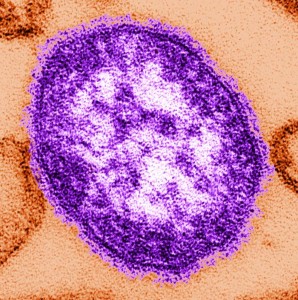Chickenpox and measles parties have made a comeback of sorts with reports of this happening in European countries during the last decade–in fact, German news source, Spiegel Online published in 2006:

Perhaps not coincidentally, measles seem to be making a bit of a comeback in Germany this spring. Fully 1,200 cases have been reported in the German state of North-Rhine Westphalia — which plays host to 11 World Cup matches — already in 2006. According to the Robert Koch Institute, the problem could easily become worse. Only 65.7 percent of Germans have had the second booster shot necessary to thwart measles.
Today, measles remains an issue in Germany reporting 10 times the numbers of that in the United States.
Joan Callahan writes in her book, Emerging Biological Threats: A Reference Guide:
In the 1950s and early 1960s, parents often held “measles parties” when one neighborhood child contracted the disease, so all of them would catch it and get it over with. This practice reflected the popular belief that measles was not dangerous.
Related: Roald Dahl 1988: Olivia and measles encephalitis
Now the fear of a comeback in the US, particularly California where the bulk of cases have been reported so far in 2015 has prompted the California Department of Public Health (CDPH) to release the following statement:
“The California Department of Public Health (CDPH) does not have any information to share about the background or frequency of pox parties. But CDPH strongly recommends against the intentional exposure of children to measles, as it unnecessarily places the exposed children at potentially grave risk and could contribute to further spread of the outbreak. Measles is a serious illness that can have significant consequences. Thirty percent of people with measles in the current California outbreak have been hospitalized.” – Dr. Gil Chavez, Deputy Director, State Epidemiologist, California Department of Public Health
Concerning the seriousness of measles, The Centers for Disease Control and Prevention reports that some people may suffer from severe complications, such as pneumonia (infection of the lungs) and encephalitis (swelling of the brain). They may need to be hospitalized and could die.
- As many as one out of every 20 children with measles gets pneumonia, the most common cause of death from measles in young children.
- About one child out of every 1,000 who get measles will develop encephalitis (swelling of the brain) that can lead to convulsions and can leave the child deaf or mentally retarded.
- For every 1,000 children who get measles, one or two will die from it.
Worldwide, according to new data published in the WHO Weekly Epidemiological Report, in 2013 there were an estimated 145,700 measles deaths.
Related: Dr. Rob Ring of ‘Autism Speaks’ calls on parents to vaccinate their kids


2 thoughts on “California warns against ‘measles parties’”